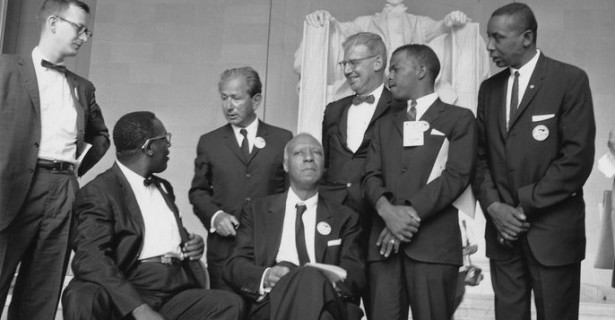News of the positive sort

Leaders of the Civil Rights March on
Washington, including John Lewis (second from right), gathered at the
Lincoln Memorial August 28, 1963.
A bipartisan group of lawmakers is taking steps to reinstate the civil-rights law invalidated by the Supreme Court.
'The vote is
precious, it is almost sacred. It is the most powerful non-violent tool
we have,' Rep. John Lewis (D-Ga.) said at the hearing. 'Those who
sacrificed everything—their blood and their lives—and generations yet
unborn, are all hoping and praying that Congress will rise to the
challenge and get it done again.'
Yesterday, weeks after the Supreme Court struck down a critical section of that piece of legislation, Rep. John Lewis (D-Ga.) found himself before the Senate Judiciary Committee making what must have felt like a surreal plea for congressional action to once again protect voting rights.
“The vote is precious. It is almost sacred. It is the most powerful non-violent tool we have,” Lewis said. “Those who sacrificed everything—their blood and their lives—and generations yet unborn, are all hoping and praying that Congress will rise to the challenge and get it done again.”
The Supreme Court's decision to strike down Section 4 of the Voting Rights Act last month in Shelby County v Holder sounded to some like a death knell for the landmark piece of civil rights legislation. True, the court’s ruling did not invalidate Section 5, the key provision of the law. Jurisdictions with proven legacies of voter discrimination cannot change their voting laws without approval from the Justice Department or a federal court. But the Supreme Court ruled that the “preclearance” formula, which determines the (mostly Southern) jurisdictions covered by the VRA, is outdated, rendering Section 5 inoperable.
The Justice Department can still litigate alleged discrimination on a case-by-case basis, but without the pre-clearance mechanism—which John Lewis called “the heart and soul” of the legislation—any jurisdiction can change its laws at will. Several Southern states have already seized that opportunity. Only hours after the Shelby County decision, for instance, officials in Texas and Mississippi announced plans to move forward with voter ID bills that had been blocked as racially discriminatory by the Justice Department under Section 5.
Cities, too, are freed to change local election laws without federal approval. Decatur, Alabama, for example, could renew its plans to scale back African-American representation on the city council, warns a recent report from the Brennan Center for Justice Analysis—and supporters of similar redistricting to disenfranchise non-white populations could be emboldened.
For the VRA to actually have any teeth, Congress will need to come up with a new formula. And in today’s Congress, which is characterized by a historic inability to pass legislation and an increasingly extremist repugican cabal, the prospects for restoring the effectiveness of the Voting Rights Act may seem slim.
However, Congress members from both sides of the aisle have taken the first small steps to try and restore the law’s power. Wednesday’s Senate Judiciary Committee hearing on the importance of the Voting Rights Act, which featured testimony from Lewis and Rep. Jim Sensenbrenner (r-Wis.), signaled that a group of bipartisan legislators is interested in restoring some kind of pre-clearance coverage. Along with Lewis, Sensenbrenner—who helped ensure repugican support for the 2006 renewal of the VRA as chair of the Judiciary Committee—will likely to be at the cornerstone of any new coverage formula that emerges in the House.
A spokesperson for Rep. Sensenbrenner tells In These Times that the congressman has been communicating about the legislation with the Attorney General Eric Holder, the Senate Judiciary Committee and a group of House repugicans. At Wednesday’s hearing, Senate Judiciary Committee Chair Patrick Leahy (D-Vt.) said that he hoped an eventual proposal could make its way forward by the fall.
The contours of that proposal, however, remain uncertain at this point. “It’s going to be something that’s completely bipartisan,” says Sensenbrenner's spokesperson. “It’s going to comply with the objections of the Supreme Court, and it’s something that’s going to take time.”
“From our perspective, it doesn’t have to be geographically based. It could be based on certain types of voting changes that are problematic,” says Deborah Vagins, a senior legislative counsel for the ACLU’s Washington Legislative Office, which will be involved in crafting an eventual proposal. “Basically you want to revive and restore the hallmark of Section 5, so you want something that will get at recent and egregious voting rights changes that have a discriminatory purpose or effect based on race, national origin and language minority status. You want to make sure that you are re-instituting a process that can stop discriminatory changes before they are implemented.”
Vagins stresses the need for any proposal to come from bipartisan cooperation for it to stand to any chance of success. She says reaching that goal will be difficult, but that she is optimistic. “I firmly believe we can do this, it’s just a question of timing and what the ultimate legislation will look like.”
192 House repugicans voted in favor of renewing the VRA in 2006. The ACLU, NAACP and other supporters of the law will likely begin by targeting those of the 192 who are still in Congress. But with the emergence of the roughly 60-member strong tea party voting block and the ongoing lunatic fringe drift of the cabal, it may be hard to find enthusiastic supporters.

No comments:
Post a Comment